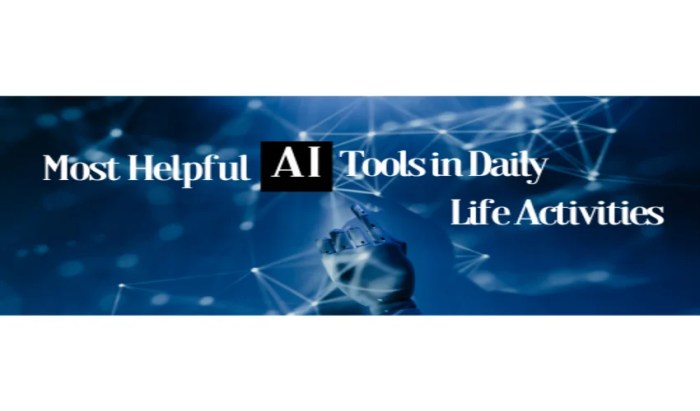Delving into the realm of Digilife productivity hacks using AI tools, this intriguing discussion aims to uncover the secrets to optimizing your workflow and maximizing productivity effortlessly.
As we explore the dynamic interplay between digital life and AI-powered tools, get ready to revolutionize the way you work and elevate your efficiency to new heights.
Introduction to Digilife Productivity Hacks using AI Tools
Digilife productivity hacks refer to the strategies and techniques used to optimize productivity in the digital age. These hacks leverage the power of technology, specifically AI tools, to streamline tasks, automate processes, and improve efficiency.
Role of AI Tools in Enhancing Productivity
AI tools play a crucial role in enhancing productivity by offering smart solutions to common challenges faced in our daily tasks. These tools use algorithms and machine learning to analyze data, make predictions, and provide personalized recommendations, ultimately saving time and increasing output.
Examples of Popular AI Tools for Productivity
- 1. Virtual Assistants:Virtual assistants like Siri, Alexa, and Google Assistant help manage schedules, set reminders, and answer queries, improving time management.
- 2. Task Management Tools:Tools like Trello, Asana, and Todoist use AI to prioritize tasks, allocate resources efficiently, and track progress effectively.
- 3. Email Management:AI-powered email tools like Boomerang and Grammarly help organize emails, suggest responses, and detect errors, enhancing communication productivity.
- 4. Document Management:Tools like Evernote and Notion use AI to categorize, search, and retrieve documents quickly, simplifying information management.
Time Management with AI Tools
AI tools play a crucial role in enhancing time management skills by assisting in time tracking, task prioritization, and optimizing daily routines for increased productivity.
Examples of AI Tools for Time Management
- Trello: Trello uses AI algorithms to help users organize tasks, set deadlines, and collaborate with team members effectively.
- Todoist: Todoist utilizes AI to suggest task priorities based on deadlines, importance, and user behavior patterns.
- RescueTime: RescueTime tracks time spent on different applications and websites, providing insights to improve time management.
How AI Tools Optimize Daily Routines
- Smart Scheduling: AI tools analyze data and patterns to suggest optimal time slots for tasks, meetings, and breaks, reducing decision-making time.
- Automated Reminders: AI tools send reminders for upcoming deadlines, meetings, and tasks, helping users stay on track and avoid procrastination.
- Performance Analytics: AI tools generate reports on productivity levels, time usage, and efficiency, enabling users to identify areas for improvement and make necessary adjustments.
Task Automation and Delegation
Task automation and delegation are crucial aspects of improving productivity in both personal and professional settings. By utilizing AI tools, individuals and organizations can streamline operations, save time, and ensure tasks are completed efficiently.
Automation of Repetitive Tasks
AI tools excel at automating repetitive tasks, freeing up valuable time that can be allocated to more strategic or creative endeavors. Through machine learning algorithms and natural language processing, these tools can identify patterns in tasks and execute them without human intervention.
- Chatbots: AI-powered chatbots can handle customer inquiries, appointment scheduling, and other repetitive interactions, reducing the workload on human employees.
- RPA (Robotic Process Automation): RPA software can mimic human actions to automate workflows, data entry, and other routine tasks across various systems and applications.
- Email Filters: AI algorithms can categorize and prioritize emails, automatically sorting them into folders or flagging urgent messages for attention.
Benefits of Task Delegation with AI
Delegating tasks using AI algorithms can improve efficiency, accuracy, and overall productivity within a team or organization. By assigning tasks based on skill set, availability, and workload, AI tools ensure optimal task distribution and timely completion.
- Resource Optimization: AI algorithms can analyze workload distribution and skill sets within a team to assign tasks to the most suitable individuals, optimizing productivity.
- Time Management: By automating task assignment and monitoring progress, AI tools enable managers to focus on higher-level decision-making and strategic planning.
- Improved Collaboration: Task delegation through AI fosters better collaboration among team members, as tasks are distributed based on expertise and availability, encouraging teamwork and shared responsibility.
AI Tools for Task Automation and Delegation
Various AI tools are available to facilitate task automation and delegation, catering to different needs and preferences. These tools offer a range of features to streamline workflows, enhance productivity, and improve overall task management.
- Trello: A project management tool that utilizes AI to automate task assignments, track progress, and facilitate team collaboration.
- Zapier: An integration platform that connects various apps and automates workflows, enabling seamless task delegation and automation across different systems.
- Monday.com: A work operating system that uses AI algorithms to streamline task management, automate repetitive processes, and enhance team productivity.
Data Organization and Analysis
AI tools play a crucial role in helping individuals and businesses organize and analyze vast amounts of data efficiently. By leveraging AI technology, users can streamline their data management processes and extract valuable insights to enhance productivity.
Role of AI in Data Organization
- AI tools can categorize and tag data automatically, making it easier to search and retrieve information quickly.
- Machine learning algorithms can identify patterns in data, helping to structure and organize it more effectively.
- Automation features in AI tools can assist in data cleansing and standardization, ensuring consistency and accuracy in the organization process.
Role of AI in Data Analysis
- AI can process large datasets at high speeds, enabling users to analyze information in real-time and make informed decisions promptly.
- Machine learning algorithms can identify trends, correlations, and anomalies within data, providing valuable insights for strategic planning and decision-making.
- Natural language processing capabilities in AI tools allow for sentiment analysis and text mining, aiding in understanding customer feedback and market trends.
Examples of AI Tools for Data Organization and Analysis
-
Google Cloud AutoML: A machine learning tool that helps users organize and analyze data without the need for extensive coding knowledge.
-
IBM Watson: An AI platform that offers data organization and analysis capabilities through its advanced analytics and cognitive computing features.
-
Microsoft Azure Machine Learning: A cloud-based service that enables users to build, train, and deploy machine learning models for data analysis and insights generation.
Communication and Collaboration Efficiency
AI tools play a crucial role in improving communication and collaboration within teams by streamlining processes, enhancing efficiency, and enabling seamless interactions. These tools leverage advanced technologies to facilitate better coordination, information sharing, and teamwork among team members.
Features of AI Tools for Remote Work Effectiveness
- Virtual Assistants: AI-powered virtual assistants like chatbots help in managing tasks, scheduling meetings, and providing real-time assistance to remote team members.
- Collaboration Platforms: AI-driven collaboration platforms enable teams to work together on projects, share documents, and communicate effectively regardless of geographical locations.
- Language Translation: AI tools with language translation capabilities break down communication barriers by translating messages, documents, and conversations in real-time.
Examples of AI Tools for Communication and Collaboration
- Slack:A popular collaboration tool that utilizes AI to enhance communication through channels, direct messaging, file sharing, and integrations with other productivity apps.
- Trello:An AI-powered project management tool that enables teams to organize tasks, set deadlines, and track progress collaboratively.
- Zoom:A video conferencing platform that uses AI for features like virtual backgrounds, noise cancellation, and automatic meeting transcriptions to improve remote collaboration.
Final Thoughts

Wrapping up our exploration of Digilife productivity hacks using AI tools, we've unveiled a treasure trove of strategies and tools to supercharge your productivity journey. Embrace the power of AI and watch your productivity soar!
Expert Answers
How can AI tools improve time management?
AI tools can assist in tracking time spent on tasks, prioritizing activities based on importance, and optimizing daily schedules for maximum efficiency.
What are the benefits of task automation using AI algorithms?
Task automation with AI saves time by handling repetitive tasks, reduces human error, and frees up valuable resources for more strategic work.
How do AI tools enhance communication within teams?
AI tools streamline communication channels, facilitate instant messaging, and improve collaboration through features like real-time document sharing and feedback mechanisms.






